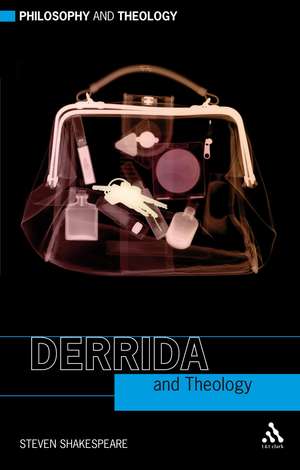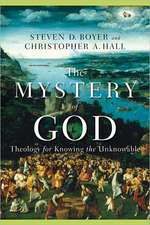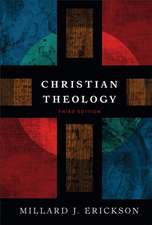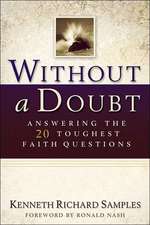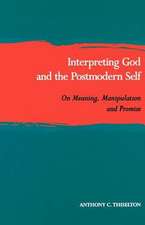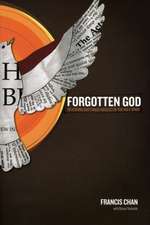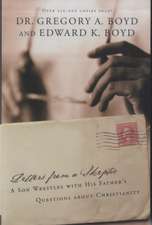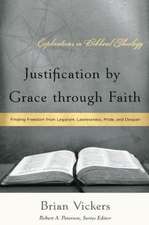Derrida and Theology: Philosophy and Theology
Autor Rev'd Dr Steven Shakespeareen Limba Engleză Paperback – 24 iun 2009
Jacques Derrida: a name to strike fear into the hearts of theologians. His ideas have been hugely influential in shaping postmodern philosophy, and its impact has been felt across the humanities from literary studies to architecture. However, he has also been associated with the specters of relativism and nihilism. Some have suggested he undermines any notion of objective truth and stable meaning.
Derrida is now increasingly seen as a major contributor to thinking about the complexity of truth, responsibility and witnessing. Theologians and biblical scholars are engaging as never before with Derrida's own deep-rooted reflections on religious themes. From the nature of faith to the name of God, from Messianism to mysticism, from forgiveness to the impossible, he has broken new ground in thinking about religion in our time. His ideas and writing style remain highly complex, however, and can be a forbidding prospect for the uninitiated. This book examines his philosophical approach, his specific work on religious themes, and the ways in which theologians have interpreted, adopted, and disputed them.
| Toate formatele și edițiile | Preț | Express |
|---|---|---|
| Paperback (1) | 178.11 lei 22-36 zile | |
| Bloomsbury Publishing – 24 iun 2009 | 178.11 lei 22-36 zile | |
| Hardback (1) | 595.89 lei 43-57 zile | |
| Bloomsbury Publishing – 24 iun 2009 | 595.89 lei 43-57 zile |
Din seria Philosophy and Theology
- 23%
 Preț: 177.93 lei
Preț: 177.93 lei - 23%
 Preț: 177.49 lei
Preț: 177.49 lei - 12%
 Preț: 216.74 lei
Preț: 216.74 lei - 23%
 Preț: 152.92 lei
Preț: 152.92 lei - 15%
 Preț: 162.80 lei
Preț: 162.80 lei - 22%
 Preț: 594.98 lei
Preț: 594.98 lei - 8%
 Preț: 158.41 lei
Preț: 158.41 lei - 14%
 Preț: 163.85 lei
Preț: 163.85 lei - 12%
 Preț: 215.34 lei
Preț: 215.34 lei - 12%
 Preț: 214.17 lei
Preț: 214.17 lei - 14%
 Preț: 189.30 lei
Preț: 189.30 lei - 14%
 Preț: 163.51 lei
Preț: 163.51 lei - 14%
 Preț: 164.77 lei
Preț: 164.77 lei - 14%
 Preț: 164.85 lei
Preț: 164.85 lei - 14%
 Preț: 164.77 lei
Preț: 164.77 lei - 22%
 Preț: 593.85 lei
Preț: 593.85 lei - 14%
 Preț: 165.21 lei
Preț: 165.21 lei - 14%
 Preț: 176.16 lei
Preț: 176.16 lei - 15%
 Preț: 175.72 lei
Preț: 175.72 lei - 14%
 Preț: 172.02 lei
Preț: 172.02 lei - 13%
 Preț: 180.33 lei
Preț: 180.33 lei - 11%
 Preț: 177.58 lei
Preț: 177.58 lei - 14%
 Preț: 178.72 lei
Preț: 178.72 lei - 22%
 Preț: 567.51 lei
Preț: 567.51 lei
Preț: 178.11 lei
Preț vechi: 207.36 lei
-14% Nou
Puncte Express: 267
Preț estimativ în valută:
34.09€ • 35.41$ • 28.31£
34.09€ • 35.41$ • 28.31£
Carte disponibilă
Livrare economică 13-27 ianuarie 25
Preluare comenzi: 021 569.72.76
Specificații
ISBN-13: 9780567032409
ISBN-10: 056703240X
Pagini: 248
Dimensiuni: 138 x 216 x 19 mm
Greutate: 0.33 kg
Editura: Bloomsbury Publishing
Colecția T&T Clark
Seria Philosophy and Theology
Locul publicării:London, United Kingdom
ISBN-10: 056703240X
Pagini: 248
Dimensiuni: 138 x 216 x 19 mm
Greutate: 0.33 kg
Editura: Bloomsbury Publishing
Colecția T&T Clark
Seria Philosophy and Theology
Locul publicării:London, United Kingdom
Caracteristici
A harmonious fusion of Derrida's work and theological belief, dispelling the traditonally antagonistic perspectives of these two schools of thought.
Cuprins
Contents
Acknowledgements
Abbreviations
Introduction
Chapter One
Savage Genesis: Complicating the Origin
Chapter Two
In the Beginning was the Word: Repeat
Chapter Three
The Other, the Thief, the great Furtive One: Naming God
Chapter Four
How to Void Speaking: Derrida and Negative Theology
Chapter Five
Messianism and the Other to Come
Chapter Six
Touching: The Impossible Gift
Chapter Seven
Gift or Poison? Theological responses
Conclusion A Useless, Indispensable Name Select
Bibliography
Index
Acknowledgements
Abbreviations
Introduction
Chapter One
Savage Genesis: Complicating the Origin
Chapter Two
In the Beginning was the Word: Repeat
Chapter Three
The Other, the Thief, the great Furtive One: Naming God
Chapter Four
How to Void Speaking: Derrida and Negative Theology
Chapter Five
Messianism and the Other to Come
Chapter Six
Touching: The Impossible Gift
Chapter Seven
Gift or Poison? Theological responses
Conclusion A Useless, Indispensable Name Select
Bibliography
Index
Recenzii
... the book serves its purpose as an introduction ([Shakespeare] should be applauded for the close reading of many primary texts that are usually ignored) and those interested in contemporary continental philosophy of religion will find this work a comprehensive and sensitive guide to Derrida.
'We are familiar with theological responses to Derrida that range from accusations of nihilism to uncritical mimicry. Rarely, however, has such a range of Derrida's writings been so judiciously sifted and evaluated with regard to their significance for theology. Students who have not yet read Derrida will find this a lucid and reliable introduction, whilst those who have already been drawn into the world of Derrida's writing will find much to help them go further. For this is not merely a step-by-step beginners' guide but the fruit of a long-standing and deeply pondered engagement with this most elusive of thinkers. It will be an important addition to any theological library.' - George Pattison, Christ Church, Oxford, UK.
'This is the most important book on Derrida and religion to come across my desk in a very long time. In page after page of limpid exposition and probing analyses of Derrida's texts, along with an incisive review of the secondary literature, Shakespeare sweeps away decades of misunderstandings of Derrida's project while clearing the way to a deeper appreciation of Derrida's importance for theology. Shakespeare shows great sensitivity both to the requirements of theological thinking and to the delicacies of deconstruction. Following the lead of Derrida's critique of the simplicity of origins, his notion of God the thief, the God of the ruse, gets closer to what Derrida is doing to and for theology than anything else I have read. Subtle, nuanced, judicious and comprehensive--in all a major achievement.' - John D. Caputo, Faculty of Religion, Syracuse University, Syracuse, NY, USA
"The book is excellent in many ways, and I would certainly recommend it to undergraduates." The Revd Sam Norton, Church Times, January 29
'His exposition is careful and relentlessly committed to reading Derrida as Derrida intends to be read. This is the book's greatest strength. Shakespeare saves until the end his interaction with the ways in which Derrida has been received by various theologianss. This gives Derrida room to speak. It is a strikingly charitable thing to do. Very few theologians give Derrida this kind of room.' - Beau Pihlaja, University of Texas at El Paso, TX, USA
'We are familiar with theological responses to Derrida that range from accusations of nihilism to uncritical mimicry. Rarely, however, has such a range of Derrida's writings been so judiciously sifted and evaluated with regard to their significance for theology. Students who have not yet read Derrida will find this a lucid and reliable introduction, whilst those who have already been drawn into the world of Derrida's writing will find much to help them go further. For this is not merely a step-by-step beginners' guide but the fruit of a long-standing and deeply pondered engagement with this most elusive of thinkers. It will be an important addition to any theological library.' - George Pattison, Christ Church, Oxford, UK.
'This is the most important book on Derrida and religion to come across my desk in a very long time. In page after page of limpid exposition and probing analyses of Derrida's texts, along with an incisive review of the secondary literature, Shakespeare sweeps away decades of misunderstandings of Derrida's project while clearing the way to a deeper appreciation of Derrida's importance for theology. Shakespeare shows great sensitivity both to the requirements of theological thinking and to the delicacies of deconstruction. Following the lead of Derrida's critique of the simplicity of origins, his notion of God the thief, the God of the ruse, gets closer to what Derrida is doing to and for theology than anything else I have read. Subtle, nuanced, judicious and comprehensive--in all a major achievement.' - John D. Caputo, Faculty of Religion, Syracuse University, Syracuse, NY, USA
"The book is excellent in many ways, and I would certainly recommend it to undergraduates." The Revd Sam Norton, Church Times, January 29
'His exposition is careful and relentlessly committed to reading Derrida as Derrida intends to be read. This is the book's greatest strength. Shakespeare saves until the end his interaction with the ways in which Derrida has been received by various theologianss. This gives Derrida room to speak. It is a strikingly charitable thing to do. Very few theologians give Derrida this kind of room.' - Beau Pihlaja, University of Texas at El Paso, TX, USA
Descriere
Descriere de la o altă ediție sau format:
Jacques Derrida's thought has been influential in shaping postmodern philosophy, and its impact has been felt across the humanities from literary studies to architecture. However, he has also been associated with the spectres of relativism and nihilism. This book gives theologians the confidence to explore the major elements of Derrida's work.
Jacques Derrida's thought has been influential in shaping postmodern philosophy, and its impact has been felt across the humanities from literary studies to architecture. However, he has also been associated with the spectres of relativism and nihilism. This book gives theologians the confidence to explore the major elements of Derrida's work.
